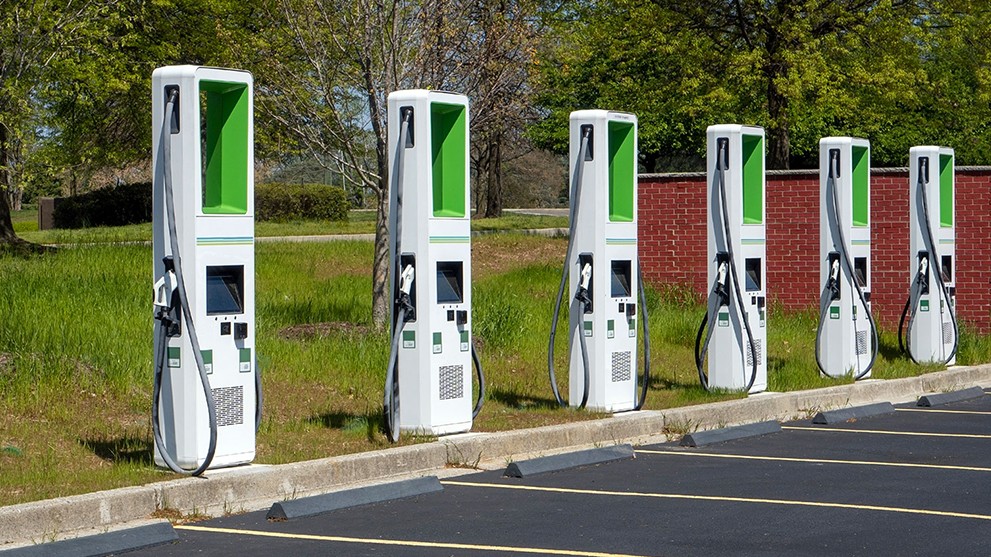
President Biden has vetoed a joint resolution of Congress that was aimed at blocking a Buy America waiver for electric vehicle (EV) chargers, issued by the Department of Transportation’s Federal Highway Administration (FHWA). The president’s support of a waiver may seem like an unusual step for an administration that has placed the implementation of Buy America policies and the curtailing of waivers at the center of its procurement policies. However, a closer look at the circumstances surrounding the waiver does not indicate a softening of the administration’s Buy America policies. It does, however, illustrate a recognition of the realities of the marketplace and a willingness to consider other policies, such as the contribution of EVs to the climate crisis, along side the implementation of Buy America policies.
When President Biden, in April 2021, set a goal of building a national network of 500,000 EV chargers by 2030, EV chargers were covered by a general applicability waiver that the FHWA had issued nearly 30 years earlier (in 1983 under President Reagan). That waiver exempted all manufactured products, including EV chargers, from Buy America requirements in projects funded by the FHWA.
The Biden administration changed that policy for EV chargers in 2023, restoring what it termed “Buy America protections consistent with the Build America, Buy America Act (BABA Act) standards, included in the Bipartisan Infrastructure Law.” In subjecting EV chargers to Buy America requirements, it sought to ensure that the national network of EV chargers would be made in America. This policy change meant that EV chargers purchased through FHWA grants were immediately subject to the requirement that they had to be manufactured in the US, using domestically produced iron and steel for charger housing.
However, EV charger manufacturers needed additional time to domestically source components for their EV chargers. As a consequence, in February 2023, the FHWA issued a temporary public interest waiver of Buy America requirements that all steel, iron, manufactured products, and construction materials used in EV chargers be produced in the US. In issuing the waiver, FHWA explained that the temporary waiver would enable EV charger acquisition and installation to proceed immediately “while also ensuring the application of Buy America to EV chargers by the phasing out of the waiver over time.” When the waiver became effective on March 23, 2023, it applied to all EV chargers manufactured by July 1, 2024, whose final assembly occurs at a US factory, and whose installation begins by October 1, 2024.
Beginning with EV chargers manufactured on or after July 1, 2024, FHWA will phase out coverage of the waiver for those previously covered EV chargers where the cost of components manufactured in the US does not exceed 55% of the cost of all components and whose final assembly occurs in the US. The waiver does not apply to EV charger housing components that are predominantly steel and iron; they must meet current FHWA Buy America requirements. FHWA also removed EV chargers from its general applicability waiver for manufactured products.
In November 2023, the Senate approved a resolution, introduced by Sen. Marco Rubio (R-FL), to block the temporary waiver. According to Inside U.S. Trade, the resolution was prompted by concerns that the waiver would facilitate federal spending on chargers made in China. On January 10, 2024, the House of Representatives also approved the resolution.
President Biden vetoed the congressional resolution on January 24, 2024. He asserted in a veto statement that the resolution would “thwart the collective goal of the Congress and the Administration to establish a domestic EV charger manufacturing industry” and delay the establishment of the EV charging network. He further contended that the resolution, if enacted, would weaken Buy America requirements by reverting to FHWA’s general waiver for manufactured products, and that would allow federal dollars, including $7.5 billion from the Bipartisan Infrastructure Law, to be spent on chargers made in countries like China (the same argument made by Senator Rubio in proposing the resolution).
UPDATE: A Senate attempt to override President Biden's veto failed on February 29, 2024, according to Inside U.S. Trade. While 50 senators voted in favor of the resolution (with 47 opposed), it failed to get the two-thirds vote required to overturn a presidential veto, leaving the waiver in place.
Jean Heilman Grier
January 31, 2024
Related Posts
2023 Developments in International Procurement
GPA Parties Criticize OMB Infrastructure Guidance
Final Infrastructure Guidance: No Trade Agreement Provisions
UPDATED (March 9, 2024) to add Senate's unsuccessful attempt to overturn the president's veto.

